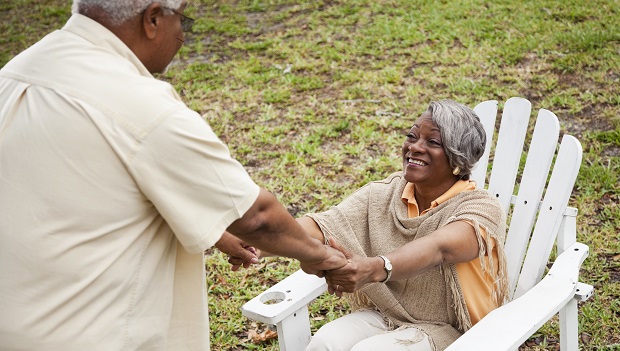Stand up for your health!

KPWHRI’s Dori Rosenberg researches ways to be less sedentary — and has 27 tips for sitting less
Did you know that too much sitting may be linked to greater risk of health problems? For example, spending most of the day sitting may contribute to heart disease, diabetes, and dementia.
Here at Kaiser Permanente Washington Health Research Institute (KPWHRI), we’re exploring the benefits of helping people be less sedentary.
Leading our research in this area is Associate Investigator Dori Rosenberg, PhD, MPH. She is studying ways to help us spend less time sitting — for example, by using commercially available fitness trackers to give reminders to get up. Rosenberg is also working with older adults in Kaiser Permanente Washington and a Latino/Latina/Latinx/Hispanic community in San Diego in the De Pie y a Movernos Study. Her research team will adapt and test their program for increasing physical activity and decreasing sitting for older adults in this community.
Among her other collaborations, Rosenberg is working with the Adult Changes in Thought (ACT) Study to explore how standing and moving more might help brain health in older adults. One of her ACT projects looks at how to use a person’s 24-hour cycle of sleep, sitting, or lying down, and physical activity to get a fuller picture of their daily activity than measuring only sitting or standing. The 24-hour activity cycle method might give us better information about movement, standing, sitting, and brain health and aging.
“Whatever your age or ability, anything you can do to stand and move a little more might improve your health,” Rosenberg said.
For most people, it’s easy to stand more — the main barrier to standing is that we forget we are sitting. Here are tips for spending more time being up and about each day so you don’t forget to take breaks from sitting.
Stand during activities when you usually sit
1. Read the newspaper, browse the internet, or catch up on emails at a counter, so you can stand for some of the time.
2. Set up a desk or writing space where you can stand.
3. When doing hobbies such as knitting or playing board games, stand at a high table or counter for some of the time or take breaks from sitting.
4. Use a standing easel to paint.
5. Stand for the first few minutes while talking on the phone.
6. Make a podium or use a standing desk to stand while reading.
7. Set computer reminders to stand and do stretches or strengthening exercises regularly when using the computer.
8. Stand for 5 minutes of a mealtime.
9. Stand during the first morning cup of tea or coffee.
Stand while watching TV — or instead of it
10. Stand, stretch, or move around the room during commercials or during half-time.
11. Only watch TV when it’s dark outside.
12. Instead of sitting down to watch TV, do it along with a standing household chore like ironing or folding clothes.
13. Get up to refill water, coffee, or other liquids during commercial breaks.
14. If watching a quiz show, stand up for each answer you get wrong.
15. Only watch planned TV shows and turn off if a show’s not interesting.
Do small bits of standing and walking all day long
16. Take a walk around the block or your house after each meal.
17. Walk your dog an extra time or an extra block each day.
18. Take the longest route to get to places within your home.
19. Make an extra loop around your home if you’re up already to do something.
20. Take a break to dance to one song.
21. Walk and talk (in person or on the phone) with a friend instead of sitting to catch up.
22. If you have children or grandchildren, do some non-sitting activities together.
23. Park the car further away when doing grocery shopping or errands.
24. Walk an extra lap around stores when shopping for groceries or doing errands.
25. Climb the stairs in your house.
26. Write a letter or postcard each day and walk to the mailbox to mail it.
27. If you live in a large building, take a walk through the hallways.
Take a break from sitting
Get up, stand up: Pilot study coaches older adults to take active breaks from sitting
(YouTube, 2:40)
Live Healthy: Top Topics
Research

Helping older adults improve health by sitting less
Dr. Dori Rosenberg discusses her work on a new Cochrane review looking at ways to help older adults be less sedentary.



